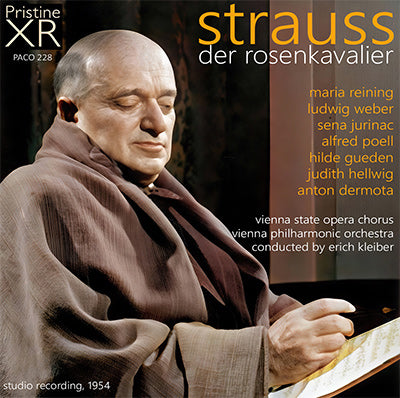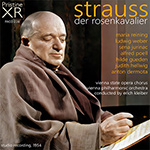
This album is included in the following sets:
This set contains the following albums:
- Producer's Note
- Full Track Listing
- Cover Art
When Richard Strauss and his librettist Hugo von Hofmannsthal created Der Rosenkavalier, they fused Viennese nostalgia with modern psychological insight. Premiered in 1911, the opera evokes the elegance of the eighteenth century while exploring universal themes of love, time, and renunciation. Its mixture of farce and melancholy, its memorable characters, and its luxuriant score quickly secured a place as Strauss’s most enduringly popular opera.
By the time Strauss composed Der Rosenkavalier, he was already established as the leading German opera composer of his generation, famed for the audacity of Salome and Elektra. With Rosenkavalier he took a deliberate turn towards warmth and accessibility, blending the sophistication of Mozartian comedy with his own lush orchestration. Its success was immediate and overwhelming, securing the financial security of both composer and librettist and ensuring Strauss’s reputation not only as a modernist provocateur but also as a master of theatrical charm and human comedy.
This 1954 Decca set, recorded in the Grosser Saal of Vienna’s Musikverein, stands as a cornerstone of Rosenkavalier’s recorded history. It brings together the Vienna Philharmonic, the Vienna State Opera Chorus, a truly distinguished cast, and the conductor Erich Kleiber, who was nearing the end of a long and distinguished career. He would die suddenly less than two years later, making this one of his final major projects.
Kleiber was long admired as one of Strauss’s most exacting interpreters. His affinity with the composer’s idiom dated back to the 1920s, when he conducted Der Rosenkavalier, Ariadne auf Naxos and Elektra in the world’s leading opera houses. His approach to Strauss combined structural discipline with lyrical warmth, qualities equally evident here. The result is a performance that feels at once unsentimental and affectionate: tempos are keenly judged, textures transparent, and the flow of the score entirely natural. Rooted in Viennese tradition yet free from indulgence, it reveals both the wit and the humanity at the heart of the opera.
The cast assembled reflects Vienna’s operatic golden age in the 1950s. Maria Reining, a mainstay of the State Opera, sings the Feldmarschallin with dignity and pathos, conveying both aristocratic poise and vulnerability. Sena Jurinac is a radiant Octavian, ardent and impulsive, her warm mezzo perfectly suited to Strauss’s demanding lines. Opposite her, Hilde Gueden gives a Sophie of youthful freshness and silvery tone, creating a partnership with Jurinac that makes the presentation of the silver rose sparkle with authenticity and charm.
Baron Ochs, Strauss’s genial comic creation, is brought to life by Ludwig Weber, one of the great Viennese basses of his era. His performance is full-bodied and steeped in buffo tradition, comic without vulgarity, pompous yet genuinely human. Alfred Poell provides a solid and sympathetic Faninal, while Judith Hellwig’s Leitmetzerin adds elegance to the great ensembles.
The supporting roles are cast from strength. Hilde Rössl-Majdan and Peter Klein relish the scheming of Annina and Valzacchi; Walter Berry, still at the outset of his career, makes an imposing Police Commissioner; and Anton Dermota lends refinement to the cameo of the Italian Singer. Even the smallest roles are memorably characterised, underscoring the care with which the entire enterprise was planned.
The Vienna Philharmonic responds to Kleiber with playing of distinction, capturing both the opulence of Strauss’s waltzes and the delicacy of his chamber-like writing. Strings shimmer, winds sparkle, and the horns add their customary glow. Decca’s engineering, though limited to mono, achieved a remarkable balance of warmth and clarity, preserving both the grandeur of Strauss’s climaxes and the intimacy of the conversational ensembles.
This recording is more than a star-studded cast album: it is a portrait of a particular Viennese style of Strauss interpretation, shaped by musicians for whom the idiom was second nature. The mixture of aristocratic refinement, youthful ardour, and deep cultural instinct makes it uniquely compelling. For Kleiber, it represents both a culmination and a farewell, summoning all his characteristic discipline and humanity in one of opera’s most bittersweet comedies.
Seven decades later, this Rosenkavalier retains its special place in the catalogue. It offers not just Strauss’s masterpiece in vivid sound but also a snapshot of post-war Vienna’s operatic tradition at its finest. In this newly restored edition, listeners can savour afresh the warmth, wit, and humanity that make Kleiber’s interpretation one of the great Rosenkavaliers on record.
R. STRAUSS Der Rosenkavalier
disc one (71:37)
ACT ONE
1. Introduction (2:51)
2. Wie du warst! (7:48)
3. Marie Theres'! - Octavian! (4:16)
4. Quinquin, es ist mein Mann! (3:28)
5. Selbstverständlich empfängt mich Ihre Gnaden (8:19)
6. Hat Sie schon einmal mit einem Kavalier (6:18)
7. Nein, er agiert mir gar zu gut! (3:39)
8. I komm' glei (2:16)
9. Di rigori armato il seno (2:54)
10. Als Morgengabe (3:11)
11. Mein lieber Hippolyte (3:39)
12. Da geht er hin (4:53)
13. Ach! Du bist wieder da! (5:32)
14. Die Zeit ist... Mein schöner Schatz... Ich werde jetzt (8:59)
15. Ich hab' ihn nicht einmal geküßt (3:35)
disc two (60:06)
ACT TWO
1. Introduction - Ein ernster Tag (2:00)
2. In dieser feierlichen Stunde (3:35)
3. Mir ist die Ehre widerfahren (6:14)
4. Ich kenn' Ihn schon recht wohl (3:44)
5. Jetzt aber kommt mein Herr Zukünftiger (3:50)
6. Eh bien! Nun plauder Sie... Wir kommen über Nacht (6:58)
7. Wird Sie das Mannsbild da heiraten (6:06)
8. Herr Baron von Lerchenau! (5:36)
9. Mord! Mord! Mein Blut! (2:12)
10. Herr Schwiegersohn! Wie ist ihm denn? (3:13)
11. Blamage! Mir auseinander meine Eh' (2:39)
12. Is gut! Is gut! Ein Schluck (2:07)
13. Da lieg' ich! (5:16)
14. Ohne mich, ohne mich, jeder Tag dir so bang (6:36)
disc three (63:53)
ACT THREE
1. Introduction and Pantomime (5:52)
2. Hab'n Euer Gnaden noch weitre Befehle? (4:08)
3. Nein, nein, nein ... Die schöne Musi! (6:47)
4. Es ist ja eh all's eins (2:56)
5. Da und da und da und da (4:19)
6. Halt! Keiner rührt sich! (3:15)
7. Zur Stelle! Was wird von mir gewünscht? (5:09)
8. Sind desto eher im klaren (2:29)
9. Bin glücklich über Massen (2:44)
10. Laß er nur gut sein und verschwind Er (6:50)
11. Leopold, wir gehn! (2:22)
12. Mein Gott, es war nicht mehr als eine Farce (6:42)
13. Marie Theres'! - Hab mir's gelobt, Ihn lieb zu haben (4:34)
14. Ist ein Traum, kann nicht wirklich sein - Spür nur dich (7:10)
CAST
Maria Reining (soprano) Feldmarschallin
Ludwig Weber (bass) Baron Ochs
Sena Jurinac (soprano) Octavian
Alfred Poell (baritone) Faninal
Hilde Gueden (soprano) Sophie
Judith Hellwig (soprano) Leitmetzerin
Peter Klein (tenor) Valzacchi
Hilde Rössl-Majdan (mezzo-soprano) Annina
Walter Berry (bass-baritone) Police Commissioner
Harald Pröglhöf (bass) Major Domo
August Jaresch (tenor) Faninal’s Major Domo
Franz Bierbach (bass) Notary
Anton Dermota (tenor) Singer
Berta Seidl (soprano) Milliner
Erich Majkut (tenor) Landlord & Animal Seller
Vienna State Opera Chorus
Vienna Philharmonic Orchestra
conducted by Erich Kleiber
Recorded 29 May-28 June, 1954
Grosser Saal, Musikverein, Vienna
Decca Producers: Victor Olof & James Walker
Engineers: Cyril Windebank & Jack Law
XR remastered in Ambient Stereo by Andrew Rose
Cover artwork based on a photograph of Erich Kleiber
Total duration: 3hr 16:58

